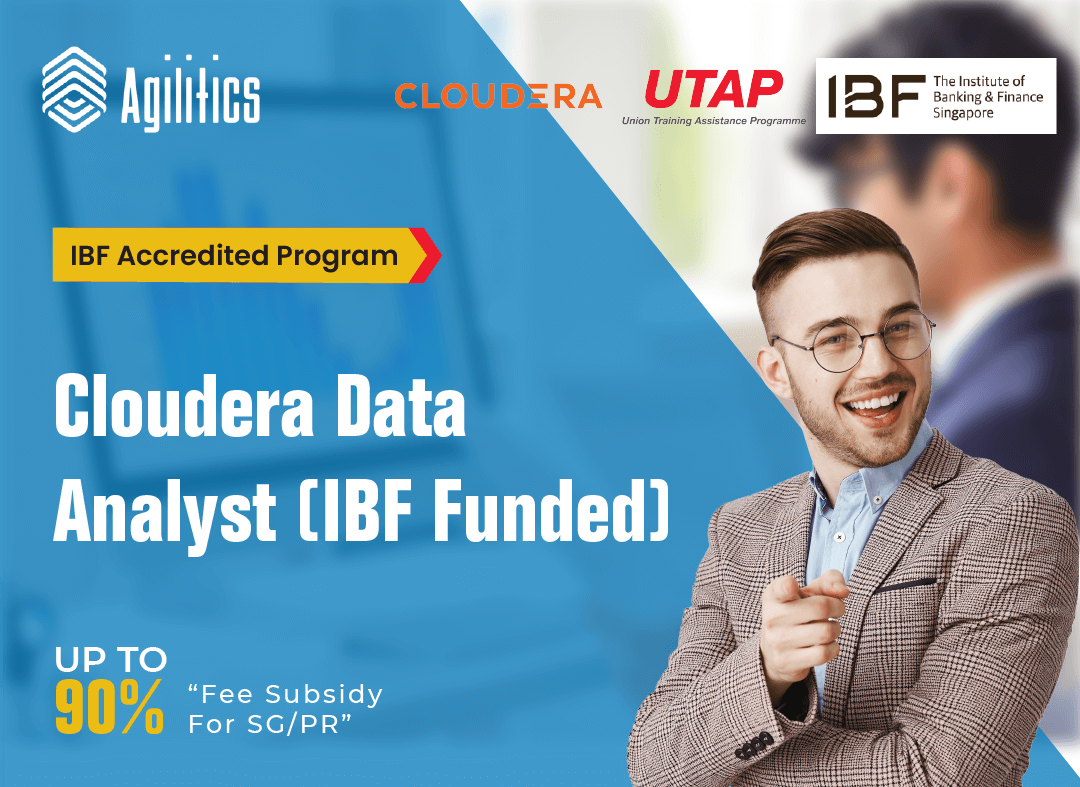
1:1 Coaching
UTAP Funded
Skills future credit claimable
90% Course Fee Subsidy for SG/PR
Globally Renowned Trainer
High Success Rate
Course Description
In this course, you learn how to design APIs, and how to use OpenAPI specifications to document them. You learn about the API life cycle, and how the Apigee API platform helps you manage all aspects of the life cycle. You learn how APIs can be designed using API proxies, and how APIs are packaged as API products to be used by app developers.
Through a combination of lectures, hands-on labs, and supplemental materials, you learn how to design, build, secure, deploy, and manage API solutions using Google Cloud’s Apigee API Platform.
What to Expect From Advanced Insight from Data Training
This course teaches participants the following skills:
- Explore and put into practice API design, development and management concepts.
- Understand the value of API-first development and how to apply it.
- Describe the fundamentals of REST API design.
- Describe API products, API product strategies, and how to publish APIs to a developer portal.
- Understand the role of user authentication and authorization and the importance of API security.
- Understand the out-of-the-box platform capabilities for implementing mediation, traffic management, caching, and fault handling.
- Describe the value and use of API analytics.
- Understand the deployment options for the Apigee platform.
Certification Curriculum
 Apigee Overview
Apigee Overview
- Understand the placement and role of API management in modern application development.
- Define logical components and organizational structure of Apigee API platform.
- Differentiate between Apigee flexible deployment models.
- Explain the API life cycle.
 API-First and OpenAPI Specifications
API-First and OpenAPI Specifications
- Describe the fundamentals of REST API design.
- Understand the value of API-First development and how to apply it.
- Discuss OpenAPI specification and its use in the context of API-First development.
 API Proxies
API Proxies
- Define the building blocks of APIs and API proxies.
- Describe how API proxies work and how capabilities such as flows, policies, route rules, environment groups, and target servers play a role.
- Describe how APIs are exposed.
- Describe how API proxies connect to backend systems.
 API Products
API Products
- Define API products and API product strategy.
- Understand the role of developers, applications, and API keys in API management.
- Describe the API publication process.
- Understand API responses and status codes for REST APIs.
 Authentication, Authorization, and OAuth
Authentication, Authorization, and OAuth
- Discuss the importance of API security.
- Understand the value of application identity.
- Understand the role of user authentication and authorization.
- Gain deep understanding of OAuth (access tokens, refresh tokens, common pattern for all grant types) and its application in the context of API design and management.
- Discuss federated identity and the use of JSON Web Tokens in API proxies.
 Content, Transport, and Internal Security
Content, Transport, and Internal Security
- Explore platform capabilities for protecting against content-based attacks.
- Discuss transport security and how to protect the connection between Apigee and backend services.
- Understand how to protect sensitive data using KVMs, data masking, and private variables.
 Mediation
Mediation
- Understand the out-of-the-box platform capabilities for implementing mediation and fault handling.
- Describe implementation patterns and policies for JSON, XML, and SOAP.
- Understand extensibility options using Service Callouts, JavaScript, and Java.
- Explore development practices and capabilities used to reuse, share, and enforce execution of flows and policies.
 Traffic Management
Traffic Management
- Describe when and how to use traffic management.
- Evaluate options and applicable use cases for rate limiting with spike arrests and quotas.
- Understand caching strategy and how to apply it.
 API Publishing
API Publishing
- Describe API publishing strategy and process.
- Expand understanding of REST API design by discussing API versioning.
- Describe the role of developer portals in the API life cycle and as a critical part of API strategy.
 Logging and Analytics
Logging and Analytics
- Discuss available options for message logging.
- Understand the value and use of API analytics.
- Understand the extensibility options available for API analytics using custom metrics and dimensions.
 Advanced Topics
Advanced Topics
- Discuss recommended practices and tooling for Apigee offline development.
- Describe the capabilities offered by the Apigee API.
- Evaluate options to leverage CI/CD as part of API life cycle.
- Explore the Apigee deployment options.
Audience & Prerequisites
This specialization is intended for the following participants:
Familiarity with HTTP, XML, JSON, and JavaScript is helpful.
Download Brochure
IBF Accredited Developing APIs with Google Cloud’s Apigee API Platform for SG/PR Singapore Training offers a 2-days Program, aimed at how to design APIs, and how to use OpenAPI specifications to document them. Download the brochure and check the different Focus Areas covered within these 2 days of training.
Certification Assessment
By the end of this course, you learn how to design APIs, and how to use OpenAPI specifications to document them. You learn about the API life cycle, and how the Apigee API platform helps you manage all aspects of the life cycle. You learn how APIs can be designed using API proxies, and how APIs are packaged as API products to be used by app developers.
- High Success rate
- Join Our Dynamic Community
- Training from Recognized Trainer
- Post-workshop support by the Coaches
Testimonials
Our clients praise us for our great results, personable service, expert knowledge, and on-time delivery. Here are what just a few of them had to say:
Funding & Price Chart
| Individual / Company Sponsored (Banking and Finance) |
Company Sponsored (Non Banking and Finance) |
||
| Singaporeans age 40 and above (70% funding) | Singaporeans age below 40 and all PRs (50% funding) | (No Funding) | |
| Full Course Fee before GST | $2,400.00 | $2,400.00 | $2,400.00 |
| 9% GST | $216.00 | $216.00 | $216.00 |
| Total Course Fee | $2,616.00 | $2,616.00 | $2,616.00 |
| Less: IBF Funding | $1,831.20 | $1,308.00 | NA |
| Net Fee Payable | $784.80 | $1,308.00 | $2,616.00 |
Frequently Asked Questions
Training FAQs
Developers, architects, or engineers responsible for the solutioning, design, implementation, or management of APIs, API products, or digital products that leverage APIs. Participants should familiarize themselves with HTTP, XML, JSON, and JavaScript is helpful.
IBF accredited programmes are designed to equip finance practitioners with the competencies needed for their jobs. Such programs are aligned with the IBF Standards, which are developed in close consultation with the industry.
The IBF Standards Training Scheme ("IBF-STS'') provides course fee subsidies to eligible company-sponsored individuals and self-sponsored individuals who complete training and assessment courses accredited under the Skills Framework for Financial Services. The Financial Training Scheme ("FTS'') provides course fee subsidies to eligible company sponsored individuals who complete financial sector-specific training courses recognized under FTS.
Payment can be made via credit card, debit card, UPI, and internet banking.
Singaporeans and Singapore Permanent Residents who successfully complete an IBF accredited program will be eligible to apply for co-funding the IBF Standards Training Scheme.
Please send in an email to enquiry@agilitics.sg, and we will answer any queries you may have!
IBF Accredited Programmes
The IBF is an independent quality assurance framework benchmarked under industry standards to get the finance practitioners future-ready by strengthening their financial capability and industrial skills.
The IBF financial training scheme provides funding for training and assessment programmes specifically to enhance the underlying competencies of the workforce in the financial/tech sector.
Training allowance grant supports banking, financial services and insurance organizations to provide industry-standard training with a focus to upgrade the skills of their employees.
You can avail of more information about the IBF course and training programs here.
The financial Institutions and fin-tech firms regulated by the Authority of Singapore can avail the benefit of course fee subsidy.
Singapore residents and permanent residents can claim upto 90% subsidy. Participants need to pay only 5% + GST to attend the training.
UTAP Funding
The UTAP (Union Training Assistance Program) is a benefit provided to NTUC members for encouraging professional upskilling at a minimal cost.
Singapore citizens and permanent residents can avail of UTAP support who are NTUC members.
UTAP provides upto 50% support of the course fee. It provides $250 for participants under 39 years and $500 for participants above 40 years.
Login to NTUC to submit your application to claim UTAP support. You can also reach out to us @ for further support.
UTAP funding can be claimed after the completion of the course only.
SkillsFuture Credit
SkillsFuture Credit is an initiative by the Singapore government to defray the training costs to encourage upgradation of skills specifically for finance/tech professions.
All Singaporeans aged 25 and above can avail of the benefit of SkillsFuture Credit. For more information, click here.
No, the small/medium sized enterprises cannot apply for SkillsFuture Credit since it is provided only to individuals.
No, SkillsFuture is not a cash account, it can be used only to offset course fees of completed training courses approved by SkillsFuture. Therefore you do not earn any interest from it.
The course fee of the training program is directly paid to the course provider through MySkillsFuture and you can avail directly from them.
You can login to MySkillsFuture, select the course and enter the details, enter course fee to be paid including GST and put the amount to be claimed. Upload invoice and click submit.






